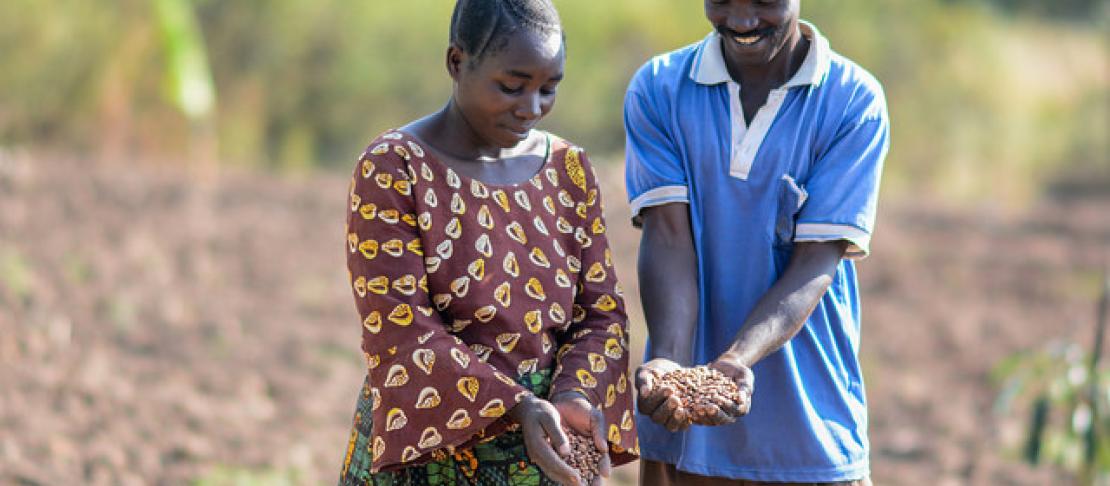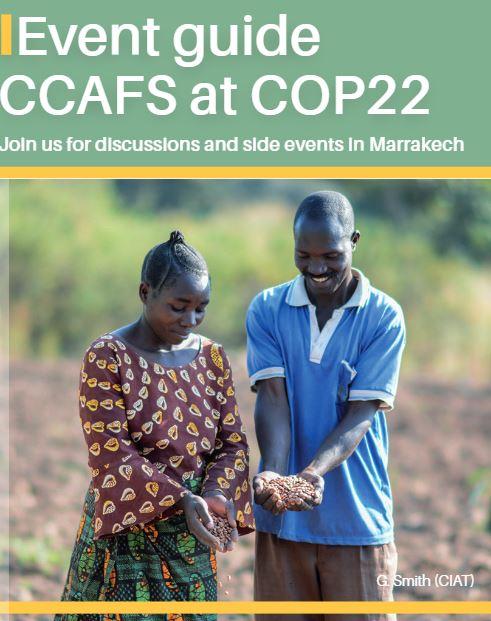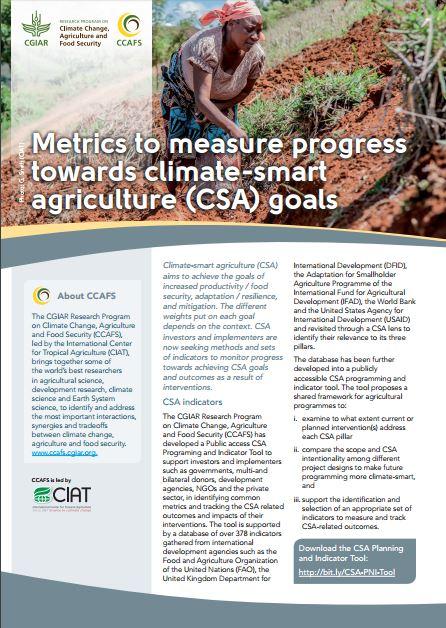Advancing agriculture at the Marrakech climate talks

Join CCAFS at COP22!
With the landmark Paris Agreement entering into force today, next week’s Conference of Parties (COP) to the United Nations Framework Convention on Climate Change (UNFCCC), in Marrakech, Morocco marks the first major opportunity to advance the implementation of the Agreement. The Marrakech climate talks also mark a milestone for negotiations on agriculture in the UNFCCC, as a 5 year process within the UNFCCC’s technical body, SBSTA, draws to a conclusion, increasing the hopes of greater support for climate actions in the agriculture sector.
CCAFS activities at the COP this year will highlight options, innovations and solutions for agriculture under climate change
The climate talks will see negotiations on a number of issues related to implementing the Agreement, including guidance on mitigation and adaptation, the transparency framework, the global stocktake, and the agreement’s entry into force.
CCAFS activities at the COP this year will highlight options, innovations and solutions for agriculture under climate change, to help Parties kick off implementation of the Paris Agreement, and identify next steps for agriculture within the SBSTA. These include:
Financing climate actions in the agriculture sector
The majority of Nationally Determined Contributions (NDCs) to the Paris Agreement propose actions in agriculture. However, these proposals are not underpinned by strong economic assessments and financial analysis, needed to unleash large-scale public and private investments. New research by International Fund for Agricultural Development (IFAD) and CCAFS explores what is needed for better economic analysis of climate actions in agriculture, and shows examples of investments that can deliver positive returns at global, national and farm levels. The resulting report on the economic advantage of climate change actions in agriculture, will be shared in Marrakech in an info note and a side event on 9 November. Opportunities to scale up investments for climate action in the agriculture sector will be discussed at an event on 12 November.
Regional efforts to support global ambitions
Countries across regions may face similar challenges under climate change, and regional efforts can be effective in supporting national responses. One such initiative at the regional level is the Adaptation of African Agriculture (AAA) initiative, a major effort led by the Moroccan Government, that aims to mobilize USD 30 billion to support innovative policies, financial mechanisms and capacity development in Africa. To be successful, this initiative needs to build on established science, including evidence about what works where, what can be scaled up, and how to build on farmer knowledge. An event on 13 November will discuss the scientific basis for this initiative; the event is organised by CCAFS, together with the government of Morocco, International Center for Agricultural Research in the Dry Areas (ICARDA), International Fertilizer Association (IFA), Groupe Crédit Agricole du Maroc, Syngenta Foundation for Sustainable Agriculture (SFSA), Agriculture and Climate Risk Enterprise (ACRE) Africa, and CTA - Technical Centre for Agricultural and Rural Co-operation ACP-EU.
In Southeast Asia, the 10 ASEAN member states recognize the common problems faced by the region’s agriculture sector, and have articulated a common position to the UNFCCC. Elements of the common position and partnerships to scale up climate actions in the region will be showcased in two events organized in partnership with the ASEAN Climate Resilience Network on the 9 November and 11 November.
View the full list of CCAFS events at COP22 in Marrakech
Recognizing the potential of regional initiatives in supporting Nationally Determined Contribution (NDC) implementation, an event at the Nordic pavilion, in partnership with the Nordic Council of Ministers and COWI, will highlight promising initiatives that can support the implementation of NDCs, on 17 November. The G7 countries also recognize the role of international initiatives in supporting climate action in the agriculture sector, and will host an event on 10 November to further catalyse the development of these initiatives, and CCAFS approach towards international agriculture research for climate action will be presented by Dr Sonja Vermeulen, Head of Research.
More inclusive climate action
Evidence and experience shows that addressing gender equality and social inclusion are critical to achieving broad-based benefits, particularly under climate change. An event on 9 November will highlight lessons for strengthening gender equality and women’s empowerment in programmes to support the adaptation of smallholder farmers to climate change. The event is organised in collaboration with CARE and IFAD. In addition, together with the Climate Smart Agriculture Youth Network (CSAYN), CLIMDEV-Africa Youth Platform (ACLYP), CCAFS will organize an event on youth engagement in climate-smart agriculture in Africa on 15 November.
Role of the private sector
Metrics to measure progress towards climate-smart agriculture (CSA) goals
At COP21, CCAFS partnered with the World Business Council for Sustainable Development (WBCSD) as the private sector announced ambitious goals for climate action the agriculture sector. This year, Sonja Vermeulen, CCAFS Head of Research will moderate the session on “Innovation and Climate Smart Agriculture” on 16 November at the Low Emissions Development Conference. The session will discuss practical solutions for climate-smart agriculture as a response to challenges as diverse as deforestation, soil and nutrient management, food loss and waste, and the protection of smallholder farmers. This event is hosted by the Government of Morocco in partnership with the UN Sustainable Development Solutions Network, World Business Council for Sustainable Development and ICLEI Local Governments for Sustainability.
Measuring the efficacy of climate actions
The Paris Agreement’s success will depend on how well countries meet their commitments under the Agreement. Sound and transparent monitoring approaches are a pre-requisite to measuring progress. A science-policy dialogue on measurement, reporting and verification (MRV) to detect mitigation impacts in livestock production systems will take place on 7 November. Panellists will share country experiences to identify practical innovations for the collection and coordination of activity data and improved emission factors. The event is organised by CCAFS, in partnership with the International Livestock Research Institute (ILRI), the Food and Agriculture Organization of the United Nations (FAO) and the Livestock Research Group of the Global Research Alliance on Agricultural Greenhouse Gases (GRA).
Are you going to COP22? Visit our exhibition booth and follow us for updates on our blog, Facebook and Twitter.
Dhanush Dinesh is the Global Policy Engagement Manager, Vanessa Meadu is the Global Communications and Knowledge Manager, Sonja Vermeulen is Head of Research, Anette Engelund Friis is Head of Program Coordination.


